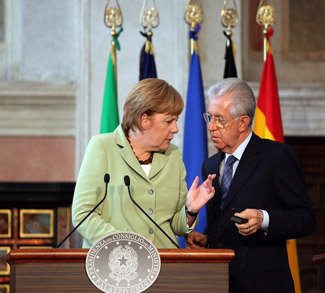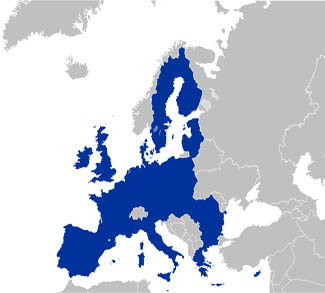Europe’s redemption lies in the re-affirmation of the Lisbon Strategy of 2000, a ten-year development plan that focused on innovation, education, and social and environmental renewal, says Anis Bajrektarevic of Geopoliticalmonitor.com.
Back in the good old days of the Lisbon Strategy, when the EU was proclaimed to be the most competitive, knowledge-based economy of the world, the Prodi and Barroso Commissions both repeatedly lamented that: “some of our global trading partners compete with primary resources, which we in the EU do not have. Some compete with cheap labor, which we do not want. Some compete on the back of their environment, which we cannot accept.”
And what has happened since the Lisbon Strategy was introduced in 2000? Over-financialization and hyper-deregulation of global markets which has brought low-wage Chinese labor into the spotlight of European considerations. Thus, in the last two decades, the EU economic edifice has gradually but steadily departed from its traditional labor-centered construct to one that is centered around overseas investment. This mega event has multiple consequences for both European cultural, socio-economic and political balances as well as China’s (overheated) growth. That little, rarefied and compressed, labor which still resides in the aging Union is either bitterly competing with or is heavily leaning on guest workers who are per definition underrepresented or silenced by the ‘rightist’ movements, and otherwise hindered in their elementary socio-political rights. That’s how Europe departed from the world of work, and that’s why the Continent cannot orient itself- both critically to identify the challenge and actively to pull together and redefine the European path. To orient, one must be centered: Without left and right, there is no center, right?
Contemporary Europe has helplessly lost its political ‘left’. The grand historical achievement of Europe – after centuries of bloody class struggle – was a final, lasting compromise between capital and labor. It resulted in a consolidation of an economically entrepreneurial and vibrant though simultaneously socially just state. This colossal civilizational accomplishment is what brought about international recognition, admiration, model attraction and competitiveness as well as inner continuity, prosperity and stability in Europe.
In the country of origin of the very word dēmokratía, the President of the Socialist International has recently introduced to his own citizenry the most drastic cuts that any European social welfare system has experienced in last 80 years. All the while, the rest of official Europe chews the so-called Greek debt tirade as if it is not about the very existence of 12 million souls, but rather a technical item to be studied in a secondary school macroeconomics course. As if by trivializing what we (want to) see, we are not ourselves brutalizing what will (later) happen to us. It seems that a non-elected government is silently pervading the EU, in ever more states.
The present-day EU, aged but not restaged, is (in) a shadow of the grand taboo that the EU can produce everything but its own life. The ‘Old Continent’ is demographically sinking, while economically just keeping afloat. The middle-class is pauperized and the cross-generational social contract is silently being abandoned, as one of its main operative instruments – the Lisbon Strategy – has been eroded to the point of incoherence.
To worsen an already substantial hardship, nearly all European states have responded to the crisis by hammering down their respective education and science R&D budgets. This is not a policy move, but an anti-visionary panic that punishes future generations. Just consider the fact that EU investment in renewables has been decreasing ever since 2008, yet the EU budget allocation for agriculture subsides is still 10 times bigger that for R&D.
What is the side-effect of any crisis of democracy? 9/11 is just one in a series of confirmations, spanning from the ‘Nixon shock’ to the ongoing Greek/Euro debt saga, that any crisis can serve those who are seeking to concentrate power in a nontransparent fashion. There is no shortage of contemporary examples that reveal how formal democracy can easily end up as an oppressive autocratic dictatorship with either police or military or both residing outside civil and democratic control. A healthy democracy will keep its financial establishment (as much as its armed organs) under strict scrutiny and civil control through clearly defined mechanisms and checks and balances. This is the quintessence of democracy.
“There has been little willingness to strengthen civic watchdogs of international financial institutions, which might provide a more accurate service than the commercially driven credit-rating agencies that performed so disastrously in the financial crisis,” laments the FRIDE Institute Director, Richard Youngs in his luminary book: Europe’s Decline and Fall. Indeed, is there any rating agency for the ethical bankruptcy, for a deep moral crisis affecting all societal segments around us?
Currently, the end game of the so-called Euro-crises seems to imply that financial institutions are neither under democratic control nor within the domain of national sovereignty. (E.g. 20 years ago, the value of overall global financial transactions was 12 times the entire world’s gross annual product. By the end of 2011, it was nearly 70 times as big.) So far, Iceland remains the only country that has indicted and sentenced its Prime Minister in relation to the financial crisis.
Therefore, negotiating on the coined “Euro-zone debt crisis” (debt bound economies) without restaging the forgotten Lisbon strategy (knowledge-based societies) is simply a lame talk about form without any substance – it is a grand bargain about control via austerity, not a vision of prosperity.
Indeed, the difference between a dialectic and cyclical history is a distance between success and fail: the later Lisbon (Treaty) should not replace but complement the previous Lisbon (Strategy). Restaging the Lisbon Strategy and reintroducing all of its contents is not just Europe’s only strategic opportunity, but its grand generational responsibility as well.
The opinions, beliefs, and viewpoints expressed by the authors are theirs alone and don’t reflect any official position of Geopoliticalmonitor.com.




